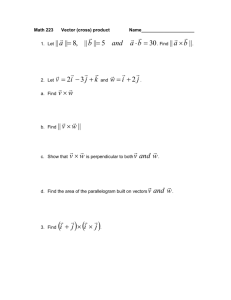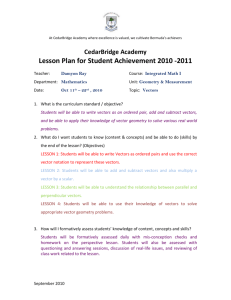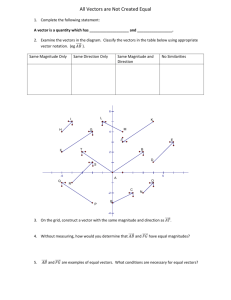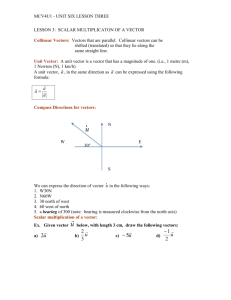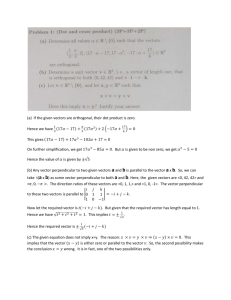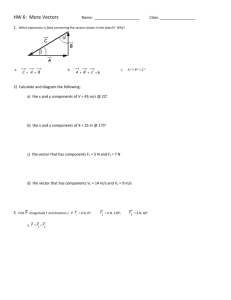Vectors Lesson Plan1
advertisement
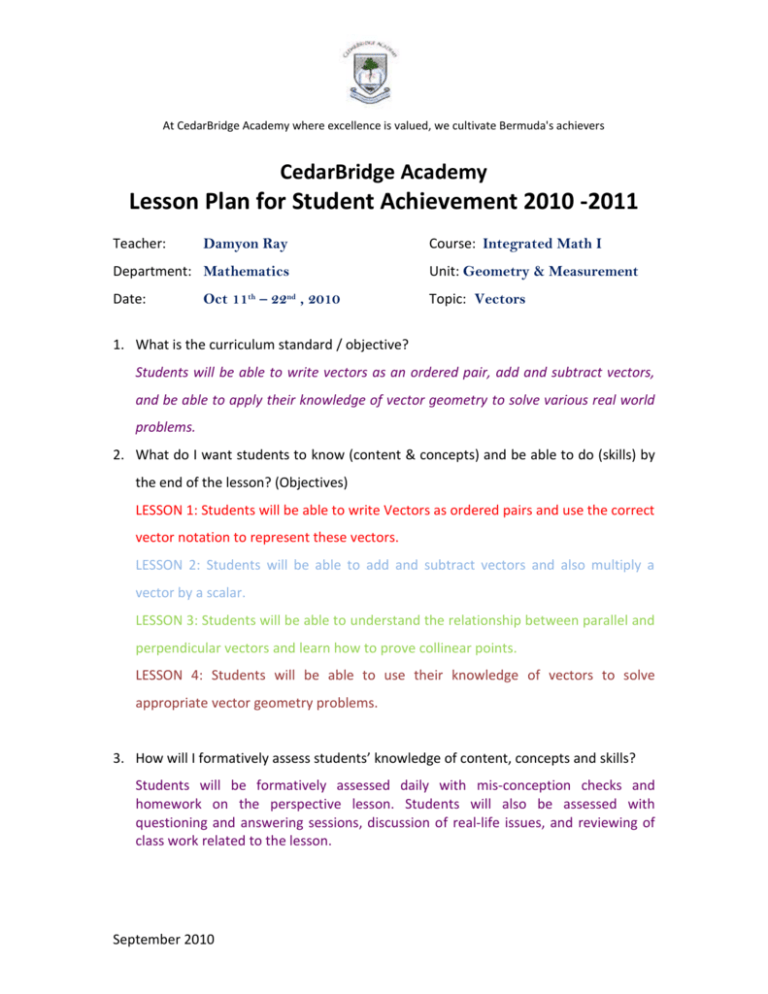
At CedarBridge Academy where excellence is valued, we cultivate Bermuda's achievers CedarBridge Academy Lesson Plan for Student Achievement 2010 -2011 Teacher: Damyon Ray Department: Mathematics Date: Oct 11th – 22nd , 2010 Course: Integrated Math I Unit: Geometry & Measurement Topic: Vectors 1. What is the curriculum standard / objective? Students will be able to write vectors as an ordered pair, add and subtract vectors, and be able to apply their knowledge of vector geometry to solve various real world problems. 2. What do I want students to know (content & concepts) and be able to do (skills) by the end of the lesson? (Objectives) LESSON 1: Students will be able to write Vectors as ordered pairs and use the correct vector notation to represent these vectors. LESSON 2: Students will be able to add and subtract vectors and also multiply a vector by a scalar. LESSON 3: Students will be able to understand the relationship between parallel and perpendicular vectors and learn how to prove collinear points. LESSON 4: Students will be able to use their knowledge of vectors to solve appropriate vector geometry problems. 3. How will I formatively assess students’ knowledge of content, concepts and skills? Students will be formatively assessed daily with mis-conception checks and homework on the perspective lesson. Students will also be assessed with questioning and answering sessions, discussion of real-life issues, and reviewing of class work related to the lesson. September 2010 4. How will I summatively assess students’ level of mastery of the content, concepts and skills? Students will be given a cumulative assessment at the end of the unit. 5. What are the key vocabulary words that I want students to be able to use during this lesson? Vector – a quantity with direction and magnitude (size). Parallel Lines – two lines that never meet and are always the same distance apart. Perpendicular lines – two lines at right angles to each other. Midpoint – the middle point of a line Collinear – points lying in a straight line 6. Describe the sequences of events in the lesson. (Focus on a high level of student engagement and remember to ask yourself if you have included the (1) Do Now activity; (2) a Motivate and Activate activity; (3) Opportunity for movement; (4) Reading & Writing activities; (5) Review; (6) How students will get written information on the content, concepts and skills; (7) Checks for understanding; (8) Gender-based activities (9) Technology (10)Research based instructional strategies; and (11) a Closure activity.) September 2010 LESSON 3 Parallel and Perpendicular Vectors 1) DO NOW −3 6 If ( ) 𝑎𝑛𝑑 ( ) are parallel, calculate x. 𝑥 8 5 Find a vector that is perpendicular to( ). −4 2) MOTIVATE AND ACTIVATE Brief discussion on parallel & perpendicular vectors and collinear points. Remind students: o That parallel vectors are multiples of each other. o Perpendicular lines are reciprocated vectors with a negative y displacement. o Collinear points 3) MOBILITY Students will come to the promethean board to show correct solutions to lesson worksheet. 4) READING AND WRITING Students will have to prove that points are collinear (lie on the same line). 5) REVIEW Teacher and students will review comprehensively the material covered in the Unit and in the lesson and analyze the connections between the new information covered. 6) AQUIRY OF INFORMATION ON THE CONTENT, CONCEPTS AND SKILLS Students will take notes in class. Students will practice various types of problems w/ assistance of a VIP. Students will discover applications through group work and other methods of instruction. 7) CHECKS FOR UNDERSTANDING Students will come to the board to work out problems as a proof of understanding and mastery of schools. The teacher will use go throughout the classroom and mark students work as they move on. Students will be encouraged to ask questions, and teacher will ask thought provoking questions to prompt students to think on their own. 8) GENDER BASED ACTIVITIES When appropriate students will split into gender pairs (only two boys in the classroom) 9) TECHNOLOGY Students will come up and use the Promethean Board 10) RESEARCHED BASED INSTRUCTIONAL ACTIVITIES Students will be expected to discover patterns and techniques via a collaborative effort by building on their experiences together. 11) CLOSURE ACTIVITIES – Students will review parallel, perpendicular lines and collinear points September 2010 LESSON 4 Vector Geometry 1) DO NOW Draw a triangle DEF and mark DE as vector a and DF as vector b. Mark in the midpoints of DE and DF as A and B respectively 2) MOTIVATE AND ACTIVATE Brief discussion on triangles, midpoints, constructions and regular and irregular polygons. o Students will recall the properties of diagonals in polygons. 3) MOBILITY Students will come to the promethean board to show correct solutions to lesson worksheet. 4) READING AND WRITING Students will have read and understand geometrical terminology and apply it to solving vector problems. 5) REVIEW Teacher and students will review comprehensively the material covered in the Unit and in the lesson and analyze the connections between the new information covered. 6) AQUIRY OF INFORMATION ON THE CONTENT, CONCEPTS AND SKILLS Students will take notes in class. Students will practice various types of problems w/ assistance of a VIP. Students will discover applications through group work and other methods of instruction. 7) CHECKS FOR UNDERSTANDING Students will come to the board to work out problems as a proof of understanding and mastery of schools. The teacher will use go throughout the classroom and mark students work as they move on. Students will be encouraged to ask questions, and teacher will ask thought provoking questions to prompt students to think on their own. 8) GENDER BASED ACTIVITIES When appropriate students will split into gender pairs (only two boys in the classroom) 9) TECHNOLOGY Students will come up and use the Promethean Board 10) RESEARCHED BASED INSTRUCTIONAL ACTIVITIES Students will be expected to discover patterns and techniques via a collaborative effort by building on their experiences together. 11) CLOSURE ACTIVITIES – Students will review parallel, perpendicular lines and collinear points as a reminder for their Assessment. September 2010 7. What homework assignment will I give to students? LESSON 1: Simplifying expression a. Students will be expected to study vector notation. LESSON 2: Adding and Subtracting Vectors b. Student will complete worksheet Apply 1 LESSON 3: Parallel and perpendicular vectors a) Students will complete worksheet Apply 2 (11 questions along with Exploration activity) LESSON 4: Vector Geometry c. Students will complete Apply 3 worksheet (9 questions along with Exploration activity) 8. (What questions do I want answered about my teaching and or student learning during the lesson?) Reflections Introduce lesson effectively Did the students remain on-task for the duration of the lesson? Was the opportunity provided for movement during the lesson? Did the gender activity assist the male students? Was opportunity for reading and writing during the lesson? Was the closure meaningful? Did the lesson reflect a balance of skills, conceptual understanding and problem solving? Were the students actively engaged in the lesson? Were students able to make connections to other ideas in their lives? September 2010
